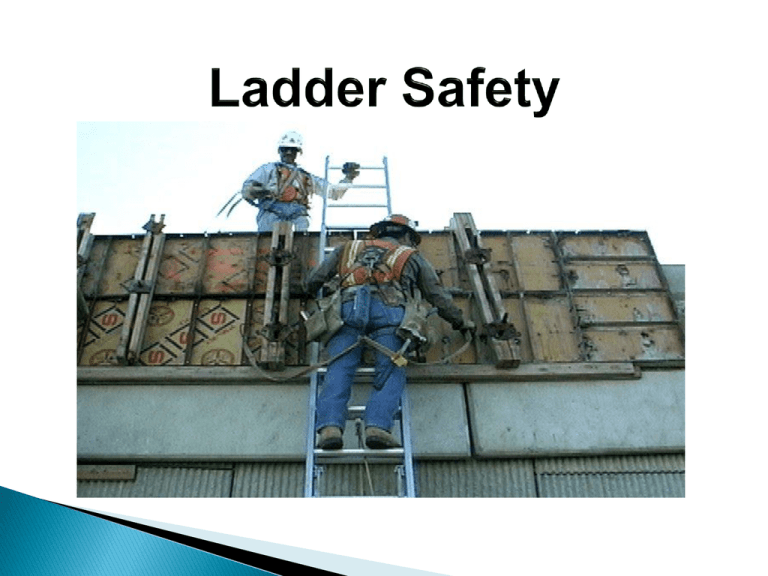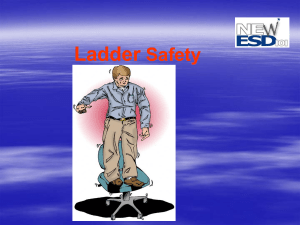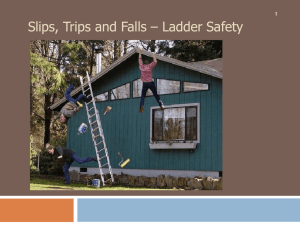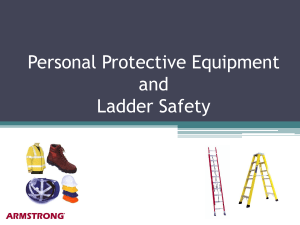Ladder Safety Training
advertisement

Copyright Progressive Business Publications This course will help you learn how to work safely when using portable ladders to avoid falling and getting injured. It is designed to promote safe work practices based on requirements of the Portable and Fixed Ladder Standards. Copyright Progressive Business Publications Introduction Reasons for falls from ladders/ladder accidents Ratings and labels on ladders Inspection Types Safe use Storage Copyright Progressive Business Publications Ladders are important and essential tools that are used widely in a variety of industries. They help us move up and down and work at different heights. Portable ladders, in particular, are useful tools because they can be readily moved or carried. They are simply built and come in many sizes, shapes and styles. Copyright Progressive Business Publications Although ladders are easy to use, they are often misused or abused, causing serious injuries and deaths. These deaths and injuries could have been significantly reduced or eliminated with proper care and use. Copyright Progressive Business Publications You don't have to fall far to get hurt. Workers injured in falls from ladders are usually less than 10 feet above the ladder's base of support. Copyright Progressive Business Publications Will the job take only a short amount of time? Ladder Scaffold Does work require side-to-side movement? Does the work require using tools with both hands? Copyright Progressive Business Publications Lift Overreaching on ladders Failure to secure ladders Climbing one-handed Standing on the top rung or platform Using worn or damaged ladders Leaving tools on ladders Copyright Progressive Business Publications Stepladders are self-supporting and good for low heights Extension or straight ladders lean against walls, allowing a higher reach Fixed ladders Copyright Progressive Business Publications Type IAA: Special-duty -- 375 lbs. Type IA: Extra heavy-duty -300 lbs. Type I: Heavy-duty -- 250 lbs. Type II: Medium-Duty -- 225 lbs. Type III: Light-Duty -- 200 lbs. Copyright Progressive Business Publications Select a ladder designed to hold the necessary load, including worker and equipment (Use only Type IA or Type I in an industrial setting) Do not assume that a longer ladder has a higher duty rating. There is no relationship between length and duty rating. The American National Standards Institute (ANSI) requires that a duty rating sticker be placed on the side of every ladder so users can determine if they have the correct type ladder for each task/job. Copyright Progressive Business Publications Check for damage prior to using: ◦ Make sure feet are not broken or malfunctioning and that the slip-resistant pads are secure. ◦ Inspect for cracks, bends & splits on the side rails, rungs & steps. ◦ Make sure both rung locks are working properly. ◦ Test the rope & pulley. Examine rope for any signs of fraying. Make sure the pulley is operating smoothly. ◦ Ensure all bolts and rivets are secure. ◦ Make sure ladder is free of foreign materials such as oil & grease. ◦ Make sure the spreader braces are secure & working properly. ◦ Aluminum or steel ladders should be inspected for rough burrs and sharp edges. Copyright Progressive Business Publications Broken or missing steps, rungs or cleats Broken or damaged side rails Other faulty equipment such as missing feet, damaged connections, broken rivets Copyright Progressive Business Publications Fiberglass ◦ Strong, lightweight, electrically nonconductive ◦ More expensive than wood or metal Fiberglass Ladder Copyright Progressive Business Publications Metal spreader or locking device on each stepladder to hold the front and back sections in an open position when the ladder is being used. Copyright Progressive Business Publications Don’t carry tools in your hands. (A tool pouch or belt should be used or tools should be hoisted up) Don’t overreach to either side or lean too far forward or backward Copyright Progressive Business Publications When climbing a ladder, you must have both hands free and face the ladder. This allows for three points of contact with the ladder at all times and reduces the chances of falling. The three point contact is two hands and one foot or one hand and two feet. This way Not this way The top or top step of a stepladder shall not be used as a step. 4 ft. rule – 3 pt. contact. Climbing ladder cross-bracing prohibited Copyright Progressive Business Publications When Working In A High Traffic Area: Place warning signs or barriers Lock doors that can swing open Have someone hold and guard the ladder Copyright Progressive Business Publications Step One - Lay the ladder on the ground Step Two - Lift end away from wall over your head and walk to wall Step Three - Pull base out with four foot to one foot rule Copyright Progressive Business Publications Lean straight ladders at a base angle of 1/4 the working length of the ladder from the top support Copyright Progressive Business Publications Place ladder on solid, dry, flat surface Level with ladder legs or stable platform Use slip resistant shoes on the ladder If accessing a roof, ladder must extend at least four rungs above the surface Warning: Improper placement of ladders causes injuries Copyright Progressive Business Publications Tie the top and bottom of the ladder to a secure location Use ladder stays if the top of the ladder must lean against a window Have a person hold the ladder if you cannot secure it with ropes or straps Copyright Progressive Business Publications Ladder rails must extend three feet (.91 m) above the landing or secured & grab rail provided Copyright Progressive Business Publications Facing the ladder and grabbing the rungs Keeping your belt buckle inside the rails Not carrying heavy or bulky loads Draping your arms around the rungs if sick, dizzy or panicky Copyright Progressive Business Publications Do not use metal or wet wooden ladders Use ladders with non-conductive side rails Keep 10 feet away from electrical sources Check for overhead hazards Copyright Progressive Business Publications Don’t use a ladder if you are feeling dizzy, light-headed, are excessively tired, on medication, have recently consumed alcohol or are otherwise temporarily impaired. Copyright Progressive Business Publications Store ladders for easy access and inspection. Store vertically if possible. If not possible, store horizontally supporting ladder at several points to avoid sagging Protect ladder from heat, weather and corrosive materials Copyright Progressive Business Publications Do not leave ladders where they may create a tripping or fall hazard for others. Do not leave or store ladders where they are exposed to the elements. Copyright Progressive Business Publications Copyright Progressive Business Publications Copyright Progressive Business Publications Copyright Progressive Business Publications Most ladder accidents are the result of careless or improper ladder usage Before climbing: ◦ Always inspect a ladder for damage ◦ Secure the ladder if unstable or unsafe As a guide, always keep your belt buckle inside the rails of the ladder Copyright Progressive Business Publications Stairways and Ladders The First Step Copyright Progressive Business Publications Copyright Progressive Business Publications









